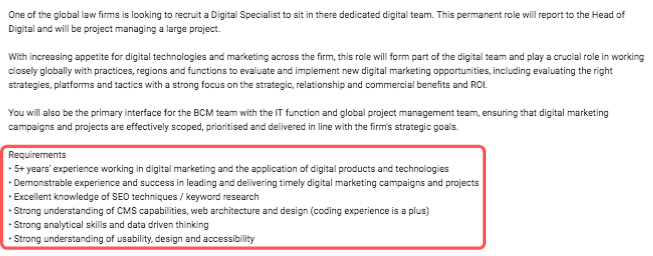Are you wondering how to find a job in London?
I have good news for you.
We created a simple (but complete) guide with the 9 steps you need to follow to find a job in London.
Here are the steps you’ll find in this guide:
- Make a List of Your Skills
- Prepare Your CV & Cover Letter
- Search for Companies That Look for Your Skills
- Connect With Recruiting Agencies
- Start Building Your Network
- Nail Your Job Interview
- Apply for a Work Visa
- Find a Flat in London
- Move to London & Start Your New Career
So without any further ado, let’s dive into the steps!
Step #1: Make a List of Your Skills
The first step toward finding a job in London is to make a list of your skills.
When I say skills, I don’t mean to include all the things that you like or are good at, but the things that:
- You enjoy doing
- You are GREAT at
To get an idea of the skills you can include, you can visit your LinkedIn profile, and head over to the Skills & Endorsements section:

Image Source: LinkedIn
Click on the “Add a new skill” button:
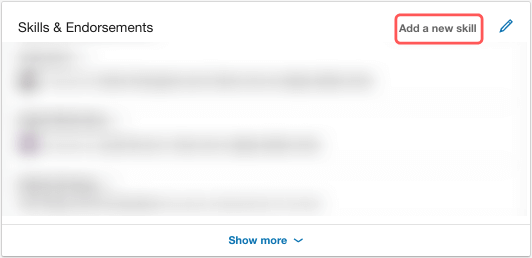
Image Source: LinkedIn
And start typing ideas based on your skills and the things that you like doing:
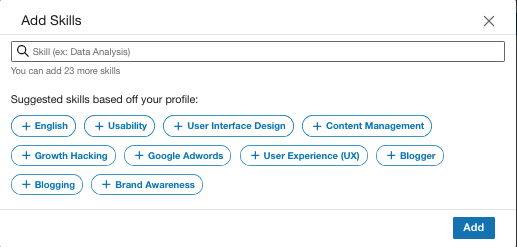
Image Source: LinkedIn
When you start typing, LinkedIn’s autofill function will pop up different ideas you can use as your skills.
Make sure to use only the ones that you are great at, and that you enjoy doing.
Bonus Tip: You can visit profiles of other professionals in your network that do the same job as you want to do, and see what skills they are using in their profile.
You may wonder why we are doing this.
The reason is simple: by making a list of your best skills and the things that you like, you eliminate many unnecessary options.
It makes sense, right?
You don’t want to find yourself applying for jobs that are irrelevant to what you like and are good at.
This way, you will:
- Save time
- Focus on things that matter
- Increase your chances of finding the job that you like
Is it easy to get a job in the UK?
Getting a job in London is not easy.
With more than 9 million people living in London, life becomes more difficult.
However, London is a city full of opportunities.
Which means that even though its difficult to find a job, eventually you’ll be able to find one.
Maybe it won’t be your dream job, but it will be enough to get you started.
One other thing you can do to discover skills you should include in your list is to visit job postings from companies that are looking for talent like you.
Let me show you how, with a quick example.
Let’s say that you are good at digital marketing, so naturally, you would search on Google for something like “digital marketing jobs in London:”
Visit some of the top results and see what skills these positions ask for:
Try to identify patterns—skills that most companies in your area of expertise ask for, and that you need to include in your set of skills.
Even if you don’t have these skills, you have to work hard to acquire them.
Now that you’ve made a list of your best skills let’s move on to the next step—prepare your CV and cover letter.
Step #2: Prepare Your CV & Cover Letter
Preparing your CV—in case you haven’t done that already—is not difficult.
There are many blog posts, guides, and videos on how to create the best CV and cover letter.
Even though most of them have useful information, they can easily confuse you.
What makes a good CV
So what makes a good CV? Is it the design, or maybe how easily readable and scannable the next is?
Here are some elements that can take your CV to the next level:
1) Make it readable
The person who is going to review your CV is going to see hundreds of CVs like yours.
Try to make their life a bit easier by making your CV easily readable and scannable.
2) Highlight relevancy points
You are probably wondering:
What is a relevancy point?
A relevancy point is something relevant to the company you are applying at, and that you happen to have as a skill or experience.
Let me give you an example.
Let’s say that you are looking at the following job post for the position of a digital marketing executive:
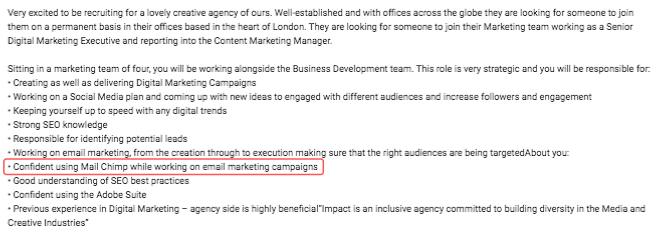
Image Source: Google Search Results
As you can see, one of the required skills is knowing Mailchimp—an Email marketing platform.
By using that to your resume, you can add +1 relevancy point and come one closer to getting hired by that company.
If you have relevant experience with that tool, for example, you can include something like:
“I successfully managed and launched more than 30 successful campaigns sent to 30K total subscribers through Mailchimp in 2019 alone.”
Cool, right?
3) Keep it short
To show that they are the most suitable candidates for the role, most people prepare and send CVs that are three, four, five—or even more—pages long.
But, no one is going to pay attention to a CV like this.
Your CV has to be relevant, short, and to the point.
Keep that in mind the next time you want to add every job you did since you were a teenager!
If you want to find more about what makes a good CV, I suggest that you take a look at the following resources:
Create a CV online
You can create your CV online, using one of the many free tools out there.
Some online tools you can use to build your CV are:
Most of these tools offer templates you can start using in just a few clicks:

Image Source: Canva
If you don’t have the time to do it yourself, you can have someone else do it for you, through one of the following freelance platforms:
The process of finding a freelancer that could help you with your CV design is relatively simple.
Let’s say that you want to use Upwork—and assuming that you have a client account—you can search for something like “CV Designer” in the search bar:

Image Source: Upwork
Scroll through the results:
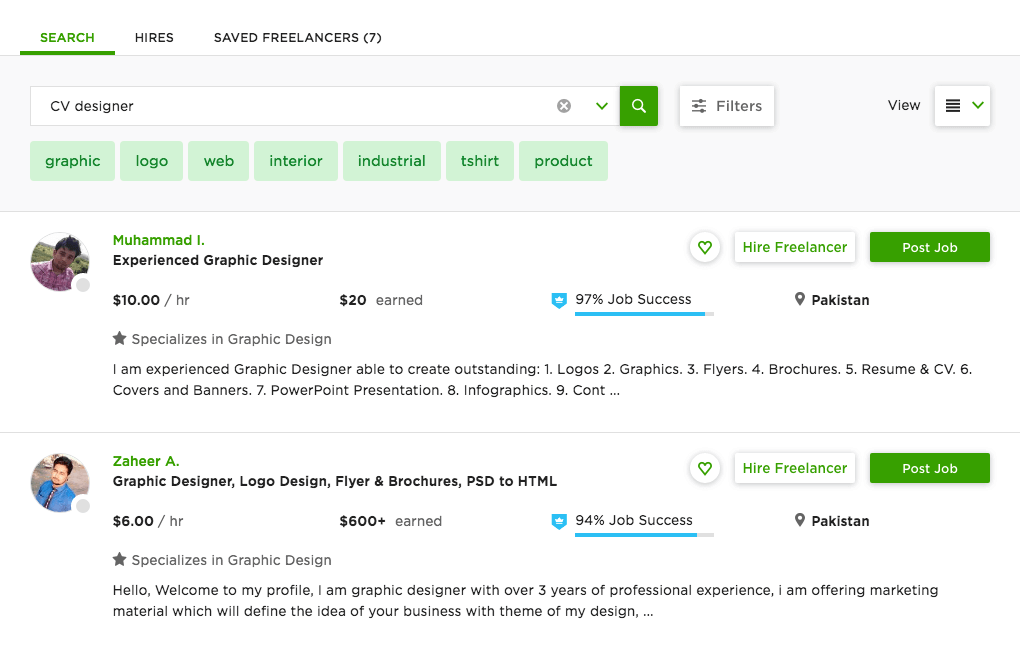
Image Source: Upwork
After doing research and visiting each designer’s profile, you can shortlist the ones that you like by clicking the heart button:
Or, you can post your own job and wait for freelancers to come to you.
Pro Tip: Ask freelancers to start their proposal with a particular word or phrase to avoid spam and automated messages. For example, ask them to start the proposal with “CV Design” to get proposals only for those who read all your job posting.
Step #3: Search for Companies That Look for Your Skills
When looking for a job, you don’t want to start sending CVs in build and see what happens.
Instead, you’d want to find companies that are relevant to what you do, and have a culture that is close to yours.
How can you find such companies?
You have to do online research.
Some websites you can use to find companies that are actively hiring are:
1) Monster
Monster is one of the leading job finding websites in the world:

Image Source: Monster.co.uk
You can use it to find companies that are hiring, connect with other job-seekers and employers.
Just enter a keyword, a location for your search, and you are good to go:

Image Source: Monster.co.uk
Monster will then show you what jobs are available.
As simple as that.
2) Gumtree
Gumtree is a British online marketplace, where you can—among others—post or find a job based on your skills and preferred location.
As you can see, there are many options you can choose from:

Image Source: Gumtree
And, when you click on one of these categories, you can browse and apply for jobs posted on Gumtree.
It’s straightforward and easy to use.
Make sure to take a look.
3) Reed.co.uk
Reed is the place where you can:

Image Source: Reed
And, Reed is indeed one of the best websites to find a job in London online.
Make sure to include it in your research.
4) indeed
This is another excellent website for those searching for a job in London.
It has a powerful search engine that allows you to browse several jobs, based on your preferences, location, or postcode.

Image Source: indeed
Pretty cool, right?
Let’s move on to the next one.
5) Angel.co
This one is for those interested in a career in tech.
Angel.co is a website that lists jobs from more than 26,376 established and startup tech companies:

Image Source: Angel.co
What makes it different?
- You can apply privately,
- You can see the salary upfront,
- You speak directly to the hiring manager.
It’s great for a young professional who wants to start a career in a London tech company.
So, make sure to visit it before you reach a decision.
6) jobsite
This is the last one I have for you.
Similarly to other job finding websites, you can use jobsite to browse and discover jobs that fit your skills.
Many companies are using this website to post their job openings:
So, if you are serious about finding a job in London, make sure to take a look.
Make a list of companies that are actively hiring
These websites can help you find companies that are looking for talent like you.
What you need to do, is make a list of these companies, along with some practical information like the title of the job or the estimated commute time to get there from your home.
Before adding a company in your list, I highly recommend that you visit a review site like Glassdoor, to see what other employees say about their experience:
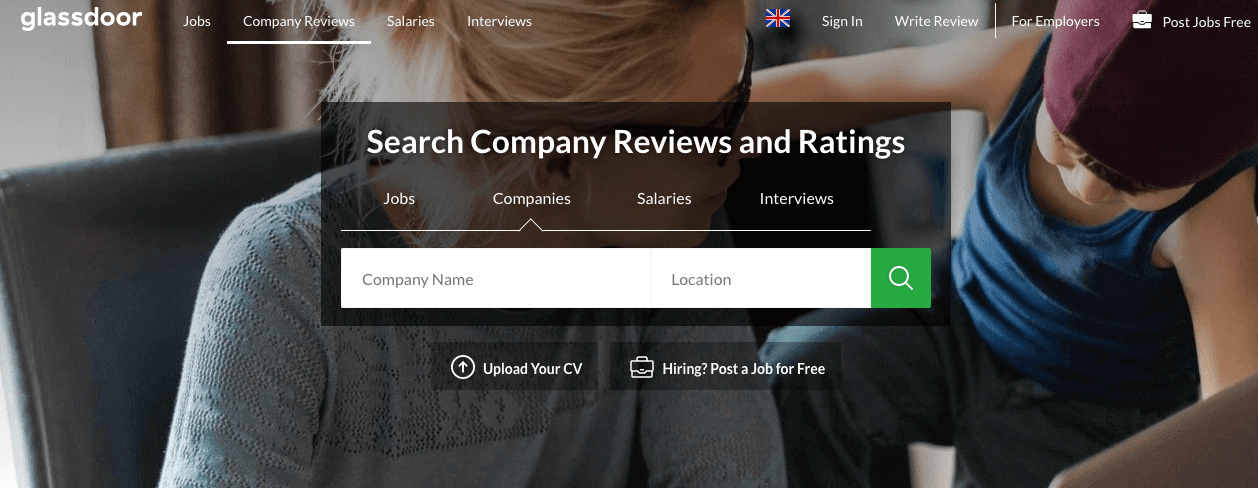
Image Source: Glassdoor
Trust me, reading reviews from current or past employees can make a huge difference in your job hunting.
Step #4: Connect With Recruiting Agencies
To maximize the chances of getting a job, you can connect with recruiting agencies.
What are recruiting agencies?
According to Wikipedia:

Image Source: Wikipedia
So an employment agency is “an organization that matches employers to employees.”
As you can imagine, in a big city like London, there are many employment agencies.
Some of the most popular ones are:
In the following link you can find a complete list of the best recruitment agencies in London:
The reason why you need to contact recruitment agencies is to increase the chances of finding a suitable job sooner.
The job sites I shared with you in the previous step are great, but if combined with a good recruitment agency, the chances of finding a job are much higher.
Some things you need to pay attention to when hiring such an agency are:
- Don’t try to impress; try to show that adding value is your primary concern
- Build a relationship first and focus on your skills and experiences later
- Show that you are driven and that you are the best person for the job
- Be sincere and transparent with all your past experiences and skills
- Explain what makes you different than other candidates
Above all: be authentic.
No need to pretend to be something you are not.
Let’s move on to the next step.
Step #5: Start Building Your Network
This is one of the most critical steps of the whole process.
I know what you are thinking:
“But, I am an introvert, how can I just go out there and meet new people?”
This is a problem for many people looking for a job.
It is of paramount importance to understand that expanding your network is a great way to meet new people and discover job opportunities.
Thus, you need to get out of your comfort zone and start meeting with new people.
Here are some things you can do:
1) Attend meetups
Meetups are great for those looking to expand their network.
Where can you find meetups that are relevant to what you want to do?
Enter: Meetup.com
Just visit Meetup and search for meetups in London.
Here are some of the meetups you are going to see:
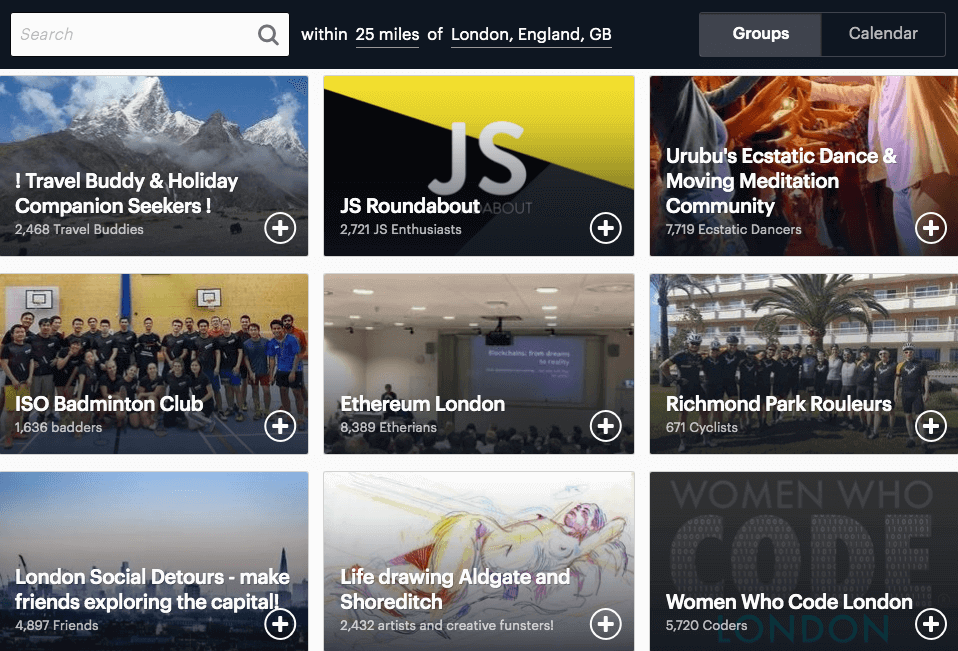
Image Source: Meetup
You will notice that there is a meeting for pretty much everything.
Just type in the meetup you’d like to attend and hit enter:

Image Source: Meetup
Meetups are ideal for newcomers, and people who have recently moved to London from abroad.
2) Visit coworking spaces
A great way to expand your network is by visiting coworking spaces.
There are many coworking spaces in London.

Image Source: Campus.co
All you need to do is find the ones that are close to where you’ll live in London, and hire a desk or space there.
These places are full of professionals like you—this will allow you to meet with like-minded people and expand your network.
3) Connect with recruiters on social media
This one is very important.
Connecting with recruiters on social media will help you find a job faster.
The question is: how can you do it?
Just search for terms like “HR Manager” on LinkedIn, and narrow your search down to London.
Then, you just need to connect with those people and engage with their content.
4) Start engaging with people’s content online
After you connect with as many relevant users as possible, you need to start engaging with their content.
You see, the more you engage, the higher the chances that these people are going to pay attention to you.
Plain and simple.
5) Establish yourself as an authority in your field
Similar to engaging with other peoples’ content, you need to publish your own content online.
You may wonder why.
Because it’s a great way to establish yourself as an authority in the field.
You can:
- Create original content from your experiences
- Curate content from various sources and publish it
- Re-share content from users in your network (and tag those users)
Expanding your network is something that will get you one step closer to the next step: the job interview.
Step #6: Nail Your Job Interview
The next step is the job interview.
Of course, you don’t need me to tell you how important this step is.
The job interview can either get you hired right on the spot or miss on a great opportunity.

Image Source: Unsplash
Having said that, you need to be well prepared for your job interview.
Here are some best practices when it comes to preparing for a job interview:
- Do research on the company and on people who previously had this role
- Make a list of possible questions along with your answers on them
- Read the job description and the requirements of the role carefully
- Prepare interesting and highly relevant questions for the recruiter
- Use the weaknesses in your profile (i.e.work gap) to your benefit
- Be ready to “sell yourself” using powerful persuasion tricks
- Print copies of your CV and other essential documents
- Do an online research on the HR manager of the company
Above all, you need to be authentic, confident, and ready to answer tough questions.
Let’s move on to step No.7.
Step #7: Apply for a Work Visa
If you are not from the UK, but you want to move and live in London, you will need a work Visa.
I suggest that you do that early on in the process so that you won’t have to deal with it later.
What is a work Visa?
A work Visa (or work permit) is a document that allows you to work and live in a country for a given period.
How to get a work visa for London
According to Learn4Good, to get a work Visa, you’ll need to have:
“A certificate of sponsorship from a licensed sponsor (į.e. potential employer) before you can apply to come to the UK to work, and the work you do in the UK must relate to the work of your sponsor organisation.”
Can you look for a job while on a visitor visa?
Of course, but you need to let your potential employer know that you don’t have a work Visa and that you’ll need a certificate of sponsorship, to be able to work there.
After getting your work Visa, you can start looking for a new apartment.
How to do that?
Let’s see…
Step #8: Find a Flat in London
Finding a flat in London is NOT easy.
Most Londoners will tell you that finding a flat has become:
- Extremely difficult
- Very expensive

Image Source: Unsplash
I don’t want to discourage you—I just want to set the expectations low so that you won’t get disappointed later on.
What are the steps you need to follow, to find a flat to rent in London?
Here are some of the most important ones:
- Make a list of the areas you are interested in
- Make a list of the best London property sites
- Make a list of trustworthy real estate agents
- Learn London’s property terms
- Make a list of must-haves
- Set a budget for your rent
- Make a schedule for your London flat hunting
- Be ready to showcase references (for your income and pets)
- Do your research about the neighborhood
- Be Flexible & Don’t Procrastinate
If you want more information on how to find a flat in London, visit our detailed guide:
How to Find a Flat in London: 10 Tips You CAN’T Miss
Let’s move on to the next (and last) step of this guide.
Step #9: Move to London & Start Your New Career
I’ll keep this one short.
After finding a job, getting a work Visa, and finding a flat to live, you’ll be ready to move to London and start your new life.
I know there are still many questions in your mind, so I suggest that you take a look at our moving to London checklist:
The Complete Moving to London Checklist [For Those Moving to London in 2022]
I hope that this checklist will help you get some of the answers you are looking for.
Before You Go!
As you can imagine, finding a job in London is NOT easy.
However, London is a city full of opportunities.
All you need to do is try to uncover those opportunities.
I hope that this guide helped you understand how to find a job in London.
Now it’s your turn:
Which one of these steps do you find to be more complicated? Is it the interview, or finding a place to live in London?
Either way, let me know by leaving a comment below!
Some additional resources you might find useful:



